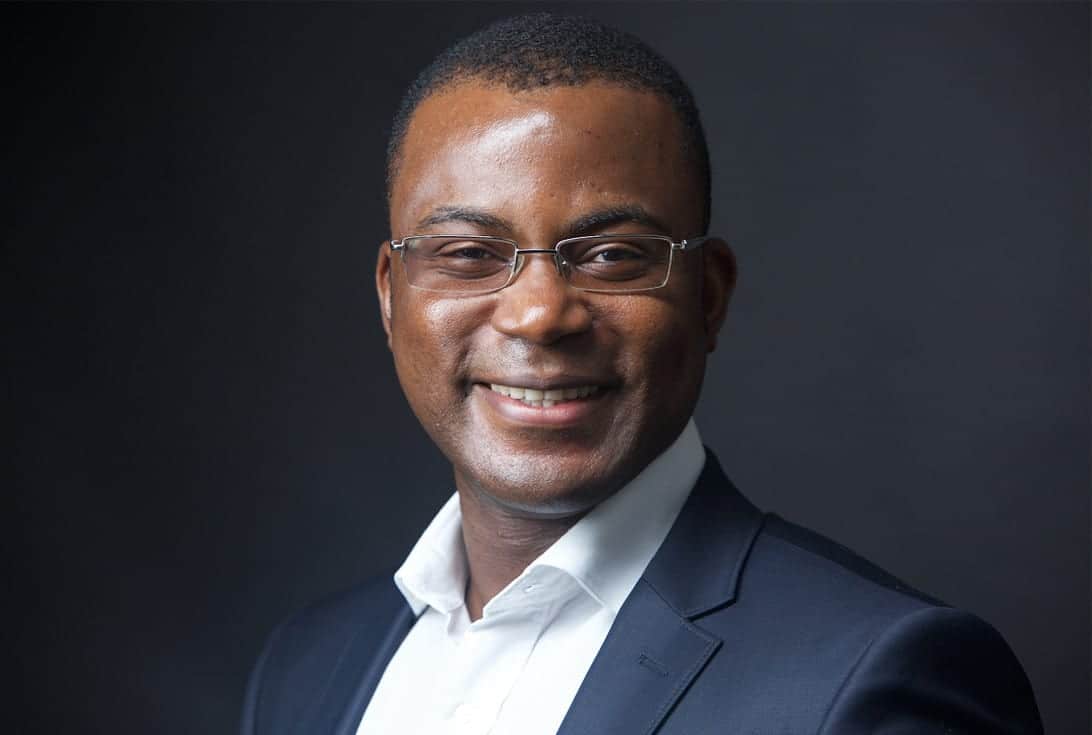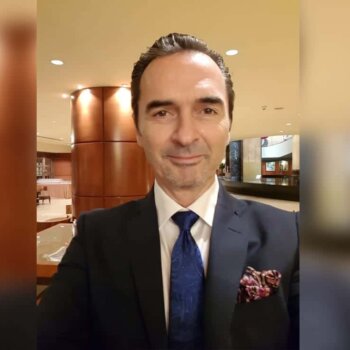Georges Tchokoua is connecting Africa’s fastest-growing entrepreneurs to global investors.
What’s your story?
My background is in statistical finance. I spent the early years of my career working in banking. After college in Paris, I started as a currency trader in London. After I graduated, I moved on to quantitative equity trading in New York, before going back to work as a financial engineer in London. I then decided to return to Africa to contribute to the economic development of the continent. After years spent in Morocco and in Cameroon, my home country, I realized, the majority of professionals are trained to be good employees, but there are not enough companies and jobs to absorb all these employees. I then went on to discover that, those venturing into entrepreneurship and innovation have limited access to coaching, mentoring, networking and financial resources. Upon relocating to New York, I started Africa Rising Invest. Our mission is to tap into the international marketplace from New York, in order to help unlock the entrepreneurial ecosystem in Sub Saharan Africa, and connecting the continent’s fastest-growing entrepreneurs to investors, globally.
What is your involvement with Investment?
Access to early-stage investment is still mystified in many Sub Saharan African countries. Though widely recognized as the main drivers of economic growth, innovation and job creation, SMEs in many cases still remain helpless when it comes to accessing finance. They are sometimes compelled to borrow short-term (3-5 years) at 15-20% from local banks or 25-30% from microfinance institutions. Many can’t meet the collateral requirements of local financial institutions.
Here is my message to SMEs: You have other options. I recently led a kick-off meeting between an SME credit fund and a West African manufacturer of plastic products looking to raise capital to scale up. In the same vein, we have signed MoUs with various institutions interested in investing in African SMEs. Finally, I am also an expert consultant with the United Nations Economic Commission for Africa (UNECA) for the capacity building program (including how to raise cheap capital to finance growth and the development of local content in the extractive sector), currently being implemented in five pilot countries.
How did that come about?
My tenure in Africa was a wake-up call. Over 95% of Africa’s economy is driven by SMEs and entrepreneurs. However, there are only 29 exchanges on the continent, representing 38 (out of 54) nation’s’ capital markets. Access to early-stage investments is nonexistent in most countries. Therefore entrepreneurs face many funding gaps during their journey. With few crowdfunding platforms, nascent incubation and acceleration centers and almost no technoparks, many are left over-relying on government grants. But these grants are limited. The amount of money in world capital markets are virtually unlimited. Thus, my partners and I founded Africa Rising Invest to connect entrepreneurs from Africa to investors from anywhere in the world. We hope to make it easier for young techies in Silicon Mountain (“Africa’s next tech hub”) in Buea and Cameroon for example, to seamlessly tap into resources coming from Boston or Singapore.
What are some of the key things you have learnt about Investing?
Humility is extremely important. Investing in general, and investing in startups in particular, is a continuous learning process. It’s very tempting to overestimate your startup selection skills and think you have a special touch. But remember, technologies evolve much faster than feedback loops in venture capital.

What mistakes do you see less experienced investors making?
Many less experienced investors expect a quick return based on good looking business plans forecasting profitable exits within 3-4 years. But behind every startup failure, there are good looking slides and spreadsheets. The reality is usually different. Angel investment is a long-term commitment.
Some less experienced investors invest in early stages with no additional capital for follow-on rounds. As the startup expands, it will require more capital. By participating in the subsequent rounds, it’s an opportunity to set the company valuation. Otherwise, as an early investor you will be diluted and end up in a position too weak to control the terms of the deal.
What mistakes do you see Entrepreneurs making?
- Most entrepreneurs tend to think VCs invest in technology. Wrong. VCs invest in businesses and people they believe can deliver; they don’t invest in ideas and technologies. Your technology is only one of many critical elements required to build a successful business.
- They tend to focus on what maximizes their ownership more than the drivers of enterprise value: Valuation, not your percentage of ownership is everything. You will have to be diluted if you want to raise capital.
What’s the best piece of advice you ever received?
Remember the last time you were preparing a presentation to speak before an audience. How long did you devote to polishing your body language and refining your voice as opposed to perfecting the words? Did you know, 55% of the meaning, people take away from any communication is based on body language, 38% on voice and only 7% on the actual words spoken? Mastering your communication skills, especially the three Vs of communication: Visual (what people see), Vocal (how it sounds), and Verbal (the actual words spoken) is key. To echo the President Gerald R. Ford, “If I went back to college again, I’d concentrate on two areas: Learning to write and to speak before an audience. Nothing in life is more important than the ability to communicate effectively.”
What advice would you give to those seeking funding?
- Fundraising is a complicated process. Have a plan, arm yourself. Be open to listen and adjust. Invest in your financial education.
- Research and diligence of your target investors, just like they diligently research you.
- Summarise your info memo or your business plan in: (i) a 10-15 page presentation, (ii) a one pager, and (iii) a 2-3 minute elevator pitch. Investors usually don’t have long attention spans. It takes time and resources to read a 50 page business plan. You may not need it.
Who inspires you?
Tony Elumelu, a Nigerian economist, entrepreneur and philanthropist. He is the Chairman of Heirs Holdings, the United Bank for Africa (UBA), Transcorp and founder of The Tony Elumelu Foundation. The Foundation’s mission is to drive Africa’s economic development by enhancing the competitiveness of its private sector. As a premier pan-African-focused not-for-profit institution, the Foundation is dedicated to the promotion and celebration of entrepreneurship and excellence in business leadership across the continent, with initiatives such as The Tony Elumelu Entrepreneurship Programme (TEEP). I still vividly remember what he told me during the African Development Forum in Casablanca, Morocco last year: “African private sector has to be the generator of the continent’s economic development.”
What have you just learnt recently that blew you away?
The concept of agglomeration: This is a unique type of collaboration where a group of SMEs from the same or similar industries can join forces and list publicly on a global exchange. It is a huge opportunity for small businesses to grow faster through using the public markets. As a “co-operative of entrepreneurs,” it is a unique innovation that can be leveraged by African SMEs to leapfrog their development curve. It can be extended to lending, microfinance, nano finance and more. Cooperation and collaboration, not competition is a crucial concept in how we download and redistribute the limited financial resources available in this world. I am eagerly looking to source potential candidates on the African continent.
What business book do you recommend the most?
“From Business Cards to Business Relationships: Personal Branding and Profitable Networking” by Allison Graham. It is well known that your network is your net worth. Most professionals (including entrepreneurs) are usually not well equipped to take advantage of profitable networking. The whole process of attending events, getting business cards and building successful business relationships is an art, which can be intimidating if not mastered. It is almost never taught in schools. But how do you build that network? This book teaches you the practical way of realising your dreams by effectively connecting with the right people, at the right time.
Shameless plug for your business/organisation:
We are committed to helping the next generation of African entrepreneurs to access global finance and to scale their business to realise their vision. We structure innovative financial instruments suitable to our global network of investors. Sub-Saharan Africa is our market. The global financial marketplace is our capital reservoir. We are sector agnostic. Examples of startups we assist include the multi-award-winning EduAir (Formerly Kwiizi): An innovative solution designed to offer access to high quality digital education to schools and universities where there is no internet connection. The solution designs portable and open media libraries in the form of Boxes, giving access to a heap of educational content and offering an integrated communication system where learners can make video calls within the local network deployed by the Box.
How can people connect with you?
Website: www.africarisinginvest.com
Email 1: [email protected]
Email 2: [email protected]
Social Media profiles?
LinkedIn: www.linkedin.com/in/georges-tchokoua
—
This article is part of the World Business Angel Forum media partnership with AsianEntrepreneur.org
If you would like more information about WBAF, please contact Callum Laing WBAF High Commissioner for Singapore. [email protected]






























